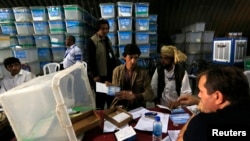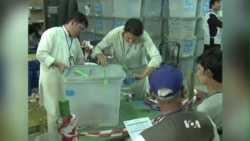After boycotting a United Nations-supervised audit of all votes from June's disputed runoff, Afghan presidential hopeful Abdullah Abdullah has now threatened to pull out from the entire political process if his demands are not met in 24 hours.
Controversies surrounding Afghanistan’s presidential election are undermining hopes for a smooth political transition in the war-ravage nation.
The Afghan Independent Election Commission [IEC] and U.N. officials say that weeks of auditing ballot boxes from the presidential runoff is near completion.
Validation process
Last week when they began the long-awaited process of validating or invalidating suspicious boxes, Abdullah pulled his observers, saying his demands for tightening the criteria were not met.
At the request of U.N. officials, rival presidential candidate Ashraf Ghani also withdrew his observers to ensure the integrity of the internationally-monitored vote scrutiny and its outcome.
Watch related video report by VOA's Meredith Buel
Political negotiations between Ghani’s and Abdullah’s teams continued for devising a framework needed to establish a so-called “national unity government” after the audit results are announced.
But on Monday a spokesman for former foreign minister Abdullah said those talks have collapsed, blaming the other side for the failure.
Spokesman Muslim Sadaat said that despite public pledges, the Ghani campaign has gone back on its commitment to form a national unity government.
“They kept wasting the time and people are very tired and exhausted of the process," Saadat said.
"Therefore, we have set a deadline for tomorrow, which means in 24 hours if they did not come and agreed with our requests and demands both on the political and technical sides, we will withdraw from the process and any result coming out of this illegal, illegitimate process will not be acceptable for our team,” he said.
News conference
Sadaat said Abdullah will hold a news conference on Tuesday to explain “how and what went wrong with both the political and technical process.”
U.S. Secretary of State John Kerry brokered the deal in early August between Ghani and Abdullah to prevent a political crisis and form a national unity government.
Washington intervened because Abdullah, who topped the first round of presidential voting in April, rejected the June runoff preliminary results that put Ghani well ahead of him, alleging massive fraud.
His supporters threatened to form a parallel government in Kabul.
Observers such as Lisa Curtis at the Heritage Foundation’s Asian Studies Center admitted that a lot of suspicions do surround the outcome of the runoff vote.
“We have to see some compromise with the situation and living up to the agreement that Secretary Kerry brokered between the two leaders, which was essentially that whatever the results were from the recount there would be a unity government in which the loser will basically serve as a chief executive," Curtis said.
"Both leaders need to see that if one of them tries to cheat the other one out of some kind of power in this unity government then both seem to lose,” she added.
The Ghani team has made few public comments about details of their political negotiations, though the presidential candidate has maintained he is ready to make compromises that do not undermine the Afghan constitution.
Karzai involvement
The U.S.-mediated deal is in tatters and deepened the uncertainty about when President Hamid Karzai can hand over power to a successor.
Karzai had earlier planned Tuesday as the inauguration day for the new president, in time for him to attend a NATO summit in Wales two days later. But that was pushed back after the United Nations said it would be able to complete the audit only by around Sept. 10.
Karzai is not going to quit power without the completion of the process, a spokesman said.
“The President is not considering the step down before the official transfer of power to the new Afghan President. It is unconstitutional to step down before officially transferring the power to his successor,” Aimal Faizi said in a statement.
Audit deadline
The United Nations hopes the audit of more than 8 million votes will be completed by September 10, paving the way for war-torn Afghanistan’s first democratic transfer of power.
A peaceful political transition is seen critical ahead of the planned withdrawal of the bulk of U.S.-led international forces by end of this year.
The prolonged political transition comes at a time of deep anxiety in Afghanistan as the United States, Kabul's biggest aid donor, and other NATO nations withdraw their troops after nearly 13 years of fighting Taliban insurgents.
Officials and diplomats fear a breakdown between the presidential candidates and the power-brokers who have a stake in the process could trigger conflict along ethnic lines, on top of the deadly insurgency.
Some information for this report provided by Reuters.













